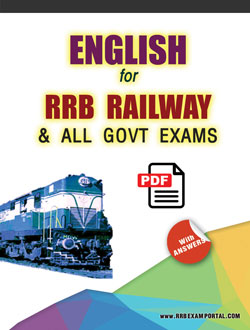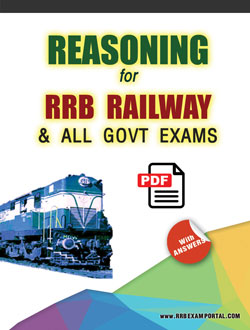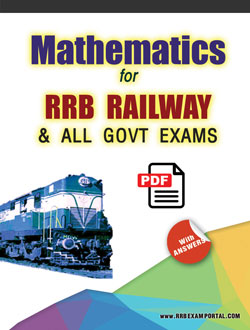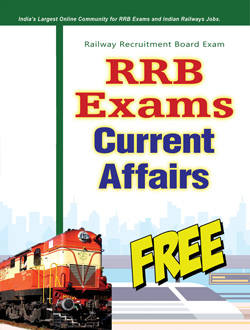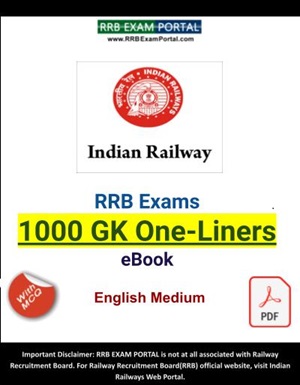Study Material For RRB Exam: General Knowledge (G.K.) - History: Modern Indian History
Study Material For RRB Exam - General Knowledge
Section : History
Modern Indian History
The period from 1707 AD, the year when Aurangzeb died, to 1857, the year of the Indian uprising. saw the gradual increase of the European influence in India. The Europeans had been filtering into India for a long time before they actually decided to set up shop here. Even though the British got away with the jackpot. the real pioneers to reach India were the Portuguese.
Portuguese Rule
The Portuguese settled down to a very prosperous trade in spices with India. The Muslim rulers in Delhi and then the Mughals never really warmed up to the idea of a foreign power continuing trade on the seas under their imperial noses. What’s more, they were not exactly very honest traders too, since they thought that no word that was given to an infidel need be kept.
Advent of Dutch
The Dutch came shipping in the East for the first time in 1595. However, they did not come to India initially, and established themselves at the helm of things in the spice trade in Jakarta. India carne into the picture for them purely as a route to Europe, as part of a great Asian trade route that they developed which went through Ceylon and Cape Town. Although the Dutch had their factories dotting all over in Cochin, Nagapatam and even up in Agra) they did not attempt to gain military power, being quite content to gain in cash.
French Invaders
Although the French King Locus XII had granted letters of monopoly to French traders in 1611, it was not until December 1667, that a French company was actually set up in India. This was at Surat (in Gujrat) with Francis Caron as its Director-General. Soon, in 1669, another French company came up in Masulipatnam, thanks to a grant by the king of Golconda. which exempted the French from paying import and export duty.
English Formed East India Company
The English, formed their East India Company on the last day of 1600 and entered the East India hand in hand with the Dutch. Their foes were common-the Portuguese and Catholic Spain and this brought them closer. However, familiarity breeds contempt, and soon the English realized that the Dutch were not willing to share their space in Spice Islands (East India) with them.
First War of Independence
Also called the Sepoy Muting or the Revolt of 1857. On 29 March 1857, during the vice-royalty of Lord Canning. an Indian Sepoy of the 34th regiment, Mangal Pandey, killed two British affairs en Parade at Barrackpore. The Indian Soldier’s Present on Parade refused to obey orders to arrest Mangal Pandey. However, he was latter arrested, and hanged.
Important of the Revolt:
- The revolt was mainly feudal in character carrying with it some nationalist elements.
- The control of Indian administration was passed on the British crown by the Government of India Act 1858.
- The army was carefully recognized to present the recruitment of such as event.
British Governor Generals and Viceroys of India
Bengal Governor General
- Warren Hastings (1772-1785)
- Lord Cornwallis (1786-1793)
- Lord Wellesley (1798-1805)
Governor Generals of India
- Lord william Bentinck (1828-1835)
- Lord Dalhousie (1848-1856)
- Lord Canning (1856-1862)
- Lord Mayo (1869-1872)
- Lord Lytton (1876-1880)
- Lord Ripon (1380-1884)
- Lord Minto (1905-1910)
- Lord Hardinge (1910-1916)
- Lord Chelmsford (1116-1921)
- Lord Reading (1921-1926)
- Lord Iraon (1926-1931)
- Lord Willingdon (1931-1936)
- Lord Linlithgow (1936-1944)
- Lord Wavell (1944-1947)
- Lord Mounthatten (March 1947-August 1947)
Important National Activities
- The Indian National Congress
- Partition of Bengal
- Swadeshi Movement (1905)
- Formation of Muslim League (1906)
- Demand for Swaraj
- Surat Session of Indian National Congress (1907)
- Indian Councils Act or Minto Morley Reforms (1909)
- Ghadar Party (1913)
- Home Rule Movement (1916)
- Lucknow Pact (1916)
- August Declaration (1917)
- Rowlatt Act (March 18, 1919)
- Jallianwala Bagh Massacre (April 13, 1919)
- Khilafat Movement (1920)
- Non-cooperation Movement (1920)
- Chauri-Chaura Incident (1922)
- Simon Commission (1927)
- Lahore Session (1929)
- Dandi March (1930)
Newspaper journals
Newspaper/journal Founder/Editor
• Bengal Gazette (1780) J.K. Hikki (India’s first newspaper) • Kesari B.G. Tilak • Maharatta B.G. Tilak Sudharak G.K. Gokhale • Amrita Bazar Patrika Sisir Kumar Ghosh and Motilal Ghosh • Vande Mataram Aurobindo Ghosh • Native Opinion V.N. Mandalik • Kavivachan Sudha Bhartendu Harishchandra • Rast Gottar Dadabhai Naoroji (First new. paper in Gujarati) • Irniia (Weekly) Bipin Chandra Pal • Staiesman Robert Knight • Hindu Vir Raghavacharya and G.S.Aiyar • Sanadhya B.B. Upadhyaya • Vii bar Lahiri Krishnashastri Chiplunkar
Venue, Year and Presidents of Indian National Congress (INC)
Year Venue President
1885, 1882 Bombay, Allahabad W.C. Bannerji
1886 Calcutta Dadabhai Naoroji
1893 Lahore Dadabhai Naoroji
1906 Calcutta Dadabhai Naoroji
1887 Madras Badruddin Tyyabji (first Muslim President)
1888 Allahabad George Yule (first English President)
1889 Bombay Sir William Wedderburn
1890 Calcutta Sir Feroze S. Mehta
1895, 1902 Poona, Ahmedabad S. N. Banerjee
1905 Banaras G. K. Gokhale
1907, 1908 Surat, Madras Rasbehari Ghosh
1909 Lahore M. M. Malviya
1916 Lucknow A. C. Majumdar (Re-union of the Congress)
1917 Calcutta Anne Besant (first Woman President)
1919 Amritsar Motilal Nehru
1920 Calcutta (sp.session) Lala Lajpat Rai
1921, 1922 Ahmedabad, Gaya C.R. Das
1923 Delhi (sp.session) Abdul Kalam Azad (youngest President)
1924 Belgaon M. K. Gandhi
1925 Kanpur Sarojini Naidu (first Indian Woman President)
1928 Calcutta Motilal Nehru (first All India Youth Congress Formed)
1929 Lahore J. L. Nehru (Poorna Swaraj resolution was passed)
1931 Karachi Vallabhbhai Patel (Here, resolution on Fundamental rights
and the National Economic Program was passed)
1932, 1933 Delhi, Calcutta (Session Banned)
1934 Bombay Rajendra Prasad
1936 Lucknow J. L. Nehru
1937 Faizpur J. L. Nehru (first session in a village)
1938 Haripura S. C. Bose (a National Planning Commission set-up under J. L. Nehru)
1939 Tripuri S. C. Bose was re-elected but had to resign due to protest by
Gandhi ji (as Gandhiji supported Dr. Pattabhi Sitaramayya).
Rajendra Prasad was appointed in his place.
1940 Ramgrah Abdul Kalam Azad
1946 Meerut Acharya J. B. Kriplani
1948 Jaipur Dr Pattabhi Sitarmayya
Important Books of Freedom Struggle Era
Book Author
Causes of the Indian Mutiny Sir Syyed Ahmed Khan Ghulam Giri Jotiba Phule To All Fighters of Freedom, Why Socialism? J. P. Narayan Pakhton Khan Problems of the East Lord Curzon My Indian Yeas Lord Hardinge II Economic History of India R.C. Dutt Pather Panchali Bibhuti Shushan Boner The Spirit of Islam Syyed Ameer Ali Precepts of Jesus Ram Mohan Roy A Gift of Monotheists Ram Mohan Roy Satyarth Prakash Swami Dayanand Anand Math Bankim C. Chatterji Devi Chaudharani Bankim C. Chatterji Sitaram Bankim C. Chatterji The Indian Struggle S. C. Bose Poverty & Un-British Rule in India Dadabhai Naoroji The Spirit of Islam Syyed Ameer Ali A Nation in the Making S. N. Banerji Unhappy India Lala Lajpat Rai The Indian War of Indeendence V. D. Savarkar India Divided Rajendra Prasad The Discovery of India J. L. Nehru Neel Darpan Dinbandhu Mitre Hind Swaraj M. K. Gandhi What Congress and Gandhi have done the untouchables B. R. Ambedkar
Important Battles of World History
Battle Period/Year Countries Involved
Battle of Megiddo 608 BC Necho of Egypt and Josiah of Judsh; Egyptians victorious
Battle of Marathon 490 BC Athenians and Persians; King Darius of Persia defeated.
Battle of Thermopylae 480 BC Spartans led by Leonidas and Persians by Xerxes; Spartans were defeated.
Battle of Salamis 480 BC Athenian and Persian fleet in the Bay of Salamis; Persian fleet defeated
Battle of Platae 479BC Greek and Persian forces; Persian forces defeated.
Battle of Mycale 479 BC Greek and Persian forces; Persian fleet defeated.
Spartan War I 459 BC Sparta and Athenes, also called ‘Pelponesian War’: it lasted for 30 years.
Spartan War II 431 – 421 BC Sparta and Athenes; Spartans victorious
Battle of Arabia 331 BC Greek and Persian forces; Greeks victorious.
Battle of Magnesia 190 BC Syrian and Roman forces; Syrian forces defeated (north-west Lydia).
Hundred Year War 1337 – 1453 France and England
War of Roses 1455 – 1485 Civil War in England between the two rival royal houses of Lancaster and
York; White and red rose were their respective symbols.
Anglo-Spanish War 1588 Spanish and English fleets fought in the English Channel; Defeat of the Spanish fleet.
Thirty Year War 1618 – 1648 Started as religious-cum-political war between (Conto) the Lutherans
and Catholics in Germany and developed into an international war.
Civil War of England 1642 – 1649 Between Cavaliers (King Charles supporters) and forces of the Parliament
led by Oliver Cromwell; King Charles I executed.

